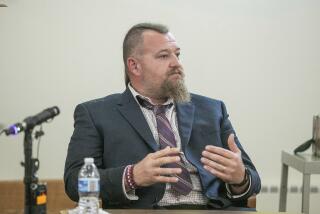Three Muslim extremists convicted of terrorist plot in Britain
LONDON – Three men accused of plotting what would have been the biggest terrorist attack in Britain since the 2005 London transit bombings were found guilty on terrorism charges Thursday.
The trio, British Muslims from the central English city of Birmingham, were accused of planning to set off up to eight bombs in backpacks in crowded places as part of a suicide rampage. Although no date or target was set for the attack, authorities who secretly recorded conversations between the men arrested them in September 2011 out of concern that they posed an imminent threat.
A search of their apartment turned up components for making bombs and instructions on how to build one, and at least two of the men, inspired by Al Qaeda and the Taliban, had gone to Pakistan for training in Islamic terrorist camps, authorities said.
The defendants – Ashik Ali, 27, Irfan Khalid, 27, and Irfan Naseer, 31 – were recorded discussing the potential use of assault rifles and poison and putting blades on the sides of cars to mow down pedestrians. They expressed hope that their casualty count would eclipse that of the July 7, 2005, suicide bombings of subway trains and a bus in central London, which killed 52 passengers.
“They were looking to kill and maim lots and lots of people. They were out to cause some really serious harm,” Asst. Chief Constable Marcus Beale of the West Midlands Police said. “From their own words, they were quite critical of the 7/7 bombers, the fact that they didn’t kill enough people. They wanted this to be their 9/11.”
The three men face life in prison when their sentences are handed down in April or May.
Prosecutors identified Naseer as the group’s leader and said he recruited other young men, several of whom have already been convicted on terrorism offenses.
“Irfan was very open about his support for jihadists in Afghanistan,” one of Naseer’s former friends told the BBC. “He was very open about his approval and admiration for the Taliban. Even within the extremist fold, he was extreme.”
Detectives had Naseer, Khalid and Ali under surveillance for weeks, bugging their car and their flat. Besides discussing methods of slaughter, the men joked about the carnage they hoped to commit and laughed about not having to renew the registration on their car since they would be dead before it expired.
The defense tried to portray the plotters as pranksters and braggarts who had no real intention of mounting an attack. But prosecutors said that the men had prepared “martyrdom” videos, and the jury ultimately rejected the defense lawyers’ characterization of their clients as comical bumblers.
“These men were the real deal,” Det. Inspector Adam Gough said. “They were committed, passionate extremists.”
To fund their campaign, the men collected public donations during the Islamic holy month of Ramadan under false pretenses, saying the money was for charity.
They were arrested after police became concerned that the plot was accelerating. Beale defended the decision to move in although no weapons had been assembled or a specific target chosen.
“At what point would people suggest we interrupt – at the moment they’re about to arrive at a shopping center, the moment they leave their home, the moment they’ve made perhaps their first device?” Beale said.
ALSO:
At least 35 reported killed as explosion rocks Syrian capital
New government, old problems as Mexico suffers from criminality
Investigator in Oscar Pistorius case faces attempted murder charges
More to Read
Sign up for Essential California
The most important California stories and recommendations in your inbox every morning.
You may occasionally receive promotional content from the Los Angeles Times.











